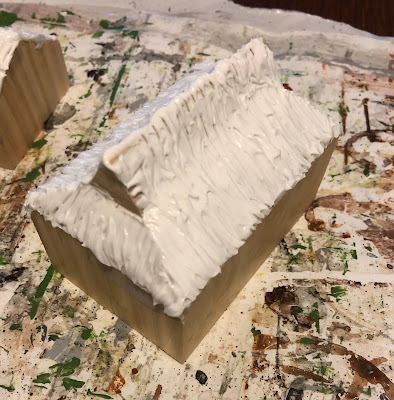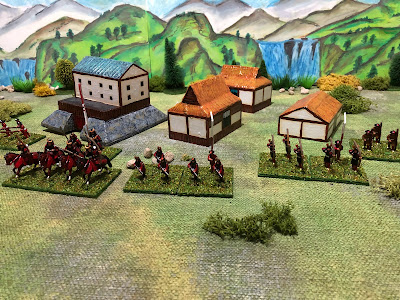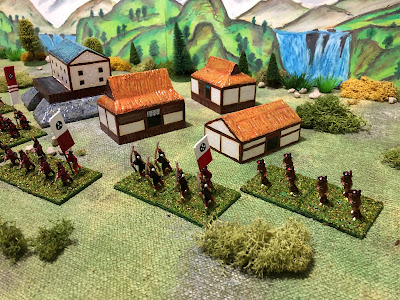I have been very slowly paint my remaining Samurai figures and needed a change. To do something different, but still for the Samurai project, I made and painted a few wooden buildings and a small castle. I generally scale down the buildings so these are scaled for 15mm for my troops are 25mm.
Most of my buildings nowadays are now made from wood with the application of some Gesso Paste to give the roofs some texture. The Gesso Paste also helps to hide my rough and ready woodwork skills. The buildings are very sturdy and can be easily packed away with no fear of breakages.
 |
| Wood buildings cut out with the Gesso Paste being applied to one of the houses. |
 |
| A toothpick is used to create the texture to help with paint washes and dry brushing. |
I won't detail how I do the painting as I have done so a couple of times before. To help me with the design and painting of the buildings I was guided by some images found on the internet after a brief Google search.
 |
| The buildings with a few troops for scale in front of the backboard I made a few weeks ago. |
 |
| Another photograph showing the wooden buildings which are very much created for wargaming. |
 |
| A close up showing the simple painting which works well with my block painted Samurai figures. |
Next up for terrain will be a couple of Japanese style bridges. Then I should be ready for a couple of games using one of the One Hour Wargames scenarios. From a rules perspective I recently bought Basic Impetus after a remote game with Jon from Palouse Wargaming Journal where Jon used a hex-grid. I am templed to see if I can apply the rules to a square grid.





Simple but very effective Peter and once on the table, they look very nice.
ReplyDeleteThanks. They are also quick and easy to make. The only waiting time is with the Gesso Paste which dries overnight.
DeleteImpressive buildings; simple, functional, and they look good.
ReplyDeleteI am always surprised at what a lick of paint can do to the simplest of models. Thank you.
DeleteWhat no temple or shrine? The dice Gods will surely punish you for this oversight!
ReplyDeleteThey are definitely on the way. A few shrines to high dice rolls are a must for all wargaming tables.
DeleteExcellent work on your Japanese buildings. Looking forward to a rematch.
ReplyDeleteThank you. I too am looking froward to the rematch. The last remote game was so enjoyable.
DeleteAs in the past, these constructions of yours are surprising effective on the tabletop - excellent work!
ReplyDeleteI suspect this will be my standard way for making tabletop buildings for a while now due to their practicality.
DeleteI love your buildings! Your use of simple wooden shapes, gesso to give texture, and painting in the detail produces very effective buildings that are ideal for use on the wargame table.
ReplyDeleteAll the best,
Bob
The Gesso Paste makes a big difference in terms of texture, but also it covers all the end grain of the wood which is a problem for painting neatly. Thanks, Peter
DeleteThese are very nice and look like they would also be far more robust than alot of the commercial stuff. The painting really brings them to life.
ReplyDeleteThank you. Getting the painting right is important, if I get it wrong I just undercoat and start again.
DeleteGreat work! I love how the same basic materials and process can yield such varied results.
ReplyDeleteThank you kindly. They are fun to make.
DeleteWhen you use these buildings in gridded games, do you leave enough space in the cells to have both the unit and the building or are buildings generally impassable?
ReplyDeleteTwo buildings and a unit can just fit into a 6 inch square. I often place the buildings on the square edges when a unit moves in so they can take up a little bit of an adjacent square.
DeleteThanks! I've been trying to minimize the footprint required to play. I'm trying to constrain myself to a 2" square. This limits me in several ways.
DeleteFirst, it almost guarantees that there is going to be a significant scale disparity between miniatures and the terrain. Secondly, if I want units to be able to occupy terrain, the terrain must share a cell with a unit, be flat-topped, or be removed to accommodate unit movement. I've gone down the making narrow terrain to share the cell, but I'm not convinced its the best route.
Peter, your scratch-building, as ever, is quite remarkable and produces really attractive terrain (buildings in this case).
ReplyDeleteImpetus should work really well and easily with a grid. I'll be interested to read how you go with them over time. I enjoyed the system at first, but found a few key mechanics that did not work/gel for me; the relative effectiveness of different types of shooting, but particularly the 'winning loss' of a discipline test passed by a unit in 'disordered'.
Regards, James
Thanks. It will be interesting to see how I progress with the rules for a square grid and get to grips with them. So far I have played two remote games using the rules modified to a hex grid hosted by Jon (of Palouse Wargaming Journal).
Delete